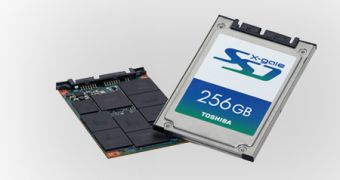SSDs are starting to become the storage solution of choice for notebook manufacturers as well (just think of the latest ultra-thin, ulta-portable computing system from Apple, the MacBook Air), and for this reason, Toshiba announced the development of the Blade X-gale SSD series, an innovative new form factor in high capacity, high performance solid-state storage.
According to Toshiba, their new SSD solution has been specifically designed for integration into space-sensitive products, including tablet PCs, laptops, mini-mobile and netbook PCs, as Toshiba's latest SSD offering helps these devices achieve a super slim profile.
"Delivering a product that enables superior user experience in a smaller footprint is the ultimate goal," noted Scott Nelson, vice president, Memory Business Unit, Toshiba America Electronic Components, Inc.
"The density of MLC NAND enables the creation of smaller form factor high density storage solutions, and Toshiba, as the technology leader for NAND storage solutions, will continue to innovate in this space,” added Mr. Nelson.
As mentioned before, the new flash storage units are the thinnest available within the company's comprehensive portfolio of SSD solutions, having a thickness of 2.2mm, which makes them 42 percent thinner than that of a typical mSATA SSD.
The new drives are offered in capacities of 64-gigabyte (GB), 128GB and 256GB, with a maximum sequential read speed of 220MB per second (MB/s) and a maximum sequential write speed of 180MB/s, all carried out via the SATA 2.6 (3Gbps) interface.
Moreover, the mean-time to failure (MTTF) is quite impressive, since we're talking about 1 million hours, which translates into an impressive 114 years.
"Up to this point, SSD designs also followed the basic design of small form factor HDD - which does not fully leverage the capabilities of high density NAND technology.
Toshiba's module-based SSDs break with this approach, giving hardware designers greater freedom and flexibility in enabling their product design," concluded Mr. Nelson.

 14 DAY TRIAL //
14 DAY TRIAL //